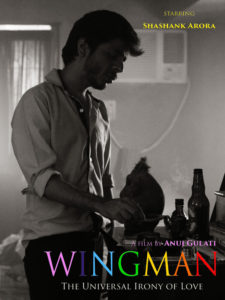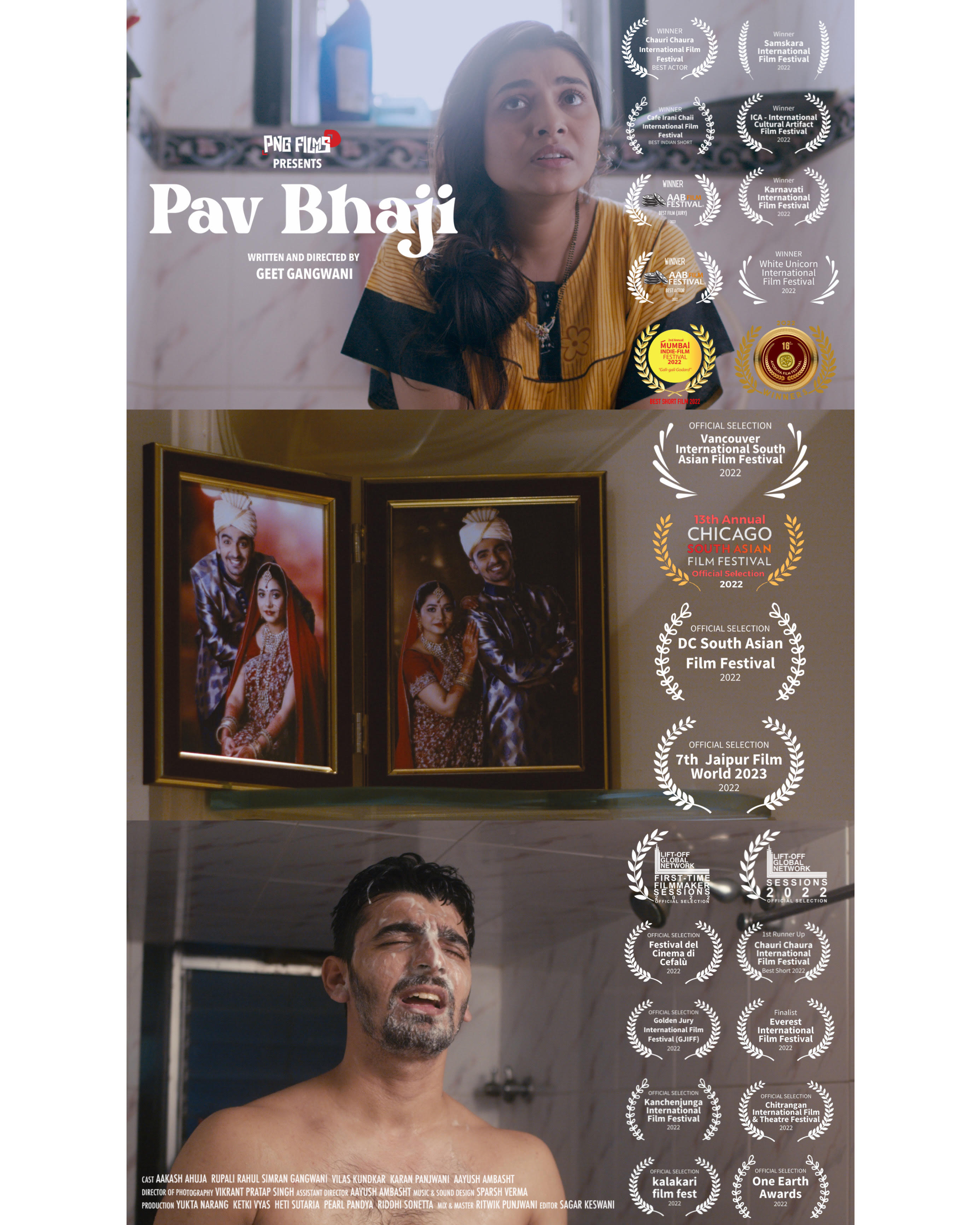
NYC SAFF 2021 Indie Film Review “Wingman (The Universal Irony of Love)”
WATCH THE TRAILER HERE
First, the Recap:
Dejected melancholy. Needless to say, this is assuredly a condition none would (I hope!) WANT to be in. The daily striving to experience happiness or at least some semblance of contentment should be what is aimed for. Unfortunately, life can throw us under the bus when we least expect it, especially it seems when it comes to matters of the heart and the relationships of a romantic nature we pursue. As usual, when that hurt is made real within us as things fall apart, what exactly do we choose to do? Omi (Shashank Arora) plods along in the daily tedium working as a matchmaker to urban callers searching for love through the company Wingman. With recent pain inflicted upon him by one-time girlfriend/childhood sweetheart Shikha (Auritra Ghosh) and seemingly unable to bounce back from it or let it go, Omi makes a decision to pursue another woman, Nisha (Trimala Adhikari), who has her own baggage to bear. Will Omi’s choices bring him the solace and love he longs for or drive him further down a path of ungratified despair?
Next, my Mind:
No matter the level of film or number of films that strike a fully or generally positive chord with this reviewer in a cinematic festival setting, there always tends to be at least one effort that leaves me a bit torn in how exactly I feel about it. No exception is made here as, in this case, it was the 72-minute indie feature film effort from writer/director/producer/editor Anuj Gulati, producers Prem Gulati, Chippy Babu, Vikram Balasubramanian, Nebil Mahaboob, Saloni Chandok, and Srinavas Ramadas, along with a host of co-producers plus executive producer Abhishek Sharma that had its NYC Premier at the 2021 NYC South Asian Film Festival sponsored by Toyota USA and hosted by Festival Director/Jingo Media Founder Jitin Hingorani and Artistic Director Ambica Dev. Perhaps it could have been the run of overall “heavier” films being shown in succession that mid-Sunday afternoon, or maybe it was just the mood the film elicited, but one way or the others, it ended up being my least favorite of the festival if a decision had to be levied.
Now, does this indicate I viewed a horrible film. Absolutely not. What it does mean, however, is that in presenting its narrative centering on an overtly emotionally compromised man and the frustrations and pitfalls of the decisions he makes in the wake of deep heartbreak and sense of loneliness and hopelessness, it’s simply a film that doesn’t truly let up in this more somber demeanor and wholly dark humor-based path, and sometimes that’s just hard to swallow. In true independent film fashion and design, the film doesn’t remotely shy away from immersing us with undaunted intention into the misery its protagonist is confronting while also providing us insight and lessons into how often we tend to potentially MISS opportunities by trying TOO hard to actually create them which subsequently end up leaving us more tattered within than when we started. The more jaded about it all we are, it only sees us hit bottom that much faster, with the climb OUT of that made more difficult, almost being blinded from seeing the joy of life in itself anymore.
Furthermore, the film also takes a viewpoint of how, despite having possibly discovered our “salvation” in love or connection again, we can then push it away and become somehow dissatisfied with it, which only puts us once more into that realm of having to face the errors and regrets birthed from it. It’s a literal exposé on the notion of looking for love in all the wrong places while likewise battling against having to release that which we formally had and lost. They move on, but we don’t. There is nothing subtle in how this film takes on these weightier thematic elements, and as mentioned earlier, it’s such a prevailing atmosphere of this nature the film elicits that when the finale arrives, just be prepared for the fact that happy endings don’t always come about. I give full credit to Gulati and Company for BEING as unshakable in the manner and content the project chooses to illustrate, as once more, it is a testament to the fearless degree by which indie filmmakers operate in, well outside the mainstream, and having a willingness to be raw and real.
What DID highly benefit the film for this critic were the actor performances themselves, beginning with Arora and the emphatically, very purposefully tempestuous atmosphere, sometimes simmering within other times almost volcanic in its outward expression, that he elicits through his role as Omi, a totally regular guy who finds himself in a state of utter internal disruption after his own love life falls to pieces while working a job that assists others in finding it. Unwilling to let the past be past, he then falls down the rabbit hole of a new but perhaps unwise relationship that only leads to further chaos, making us wonder if he will truly ever recover and experience normalcy. While there’s one person whom he ends up helping in the midst of his own turmoil, even this may not be enough to see self worth and a future outside of pensiveness. It’s one of those volatile characters that I wouldn’t think is easy to embody, but Arora does a superb job at showcasing Omi and his struggles with finesse and certainly realistic gravitas.
Adhikari also shines here as Omi’s newest interest Nisha, a carefree but also troubled woman whose air of independence and hesitant but approachable charm captures Omi like a magnet. Even as she slowly sees the attraction herself, pushing into it becomes a larger chore than she might have expected, especially when a particular facet of her own life comes to light that initially puts a sense of both challenge and excitement into the pair’s budding bond. But, even as Nisha continues to pursue her own growing feelings for Omi, his attitudes and pining for love already lost starts to pose an issue that he doesn’t seem to want to let go of, and Nisha begins to question the validity of what they have, more so when Omi shows signs of wanting to push her away rather than take things to another level. Throughout the film, Adhikari’s portrayal of Nisha is one we can find ourselves be both sympathetic towards yet also somewhat incensed with as we have doubts that she’s really at all what Omi needs. This is a credit to Adhikari’s passionate performance.
Primary supporting roles arrive from Ghosh as Omi’s former flame Shikha whose choice to move on to greener relationship pastures leaves Omi an outright wreck even as she has engaged with a new beau but still has to ward off Omi’s continuing attempts to reach her. Nakul Bhalla plays Karan, Shikha’s boyfriend who has more than a few minor run-ins with a certain ex of hers and has to find patience and means to deal with it. Kartik Krishnan, while “appearing” in voice form only, plays a key part in this story and might be the sole source of ANY light Omi has in his current circumstances. Krishna Singh Bisht plays one of Nisha’s colleagues, Nitish Pandey arrives as one of Omi’s colleagues, and Aaradhna Uppal is Omi’s boss at Wingman. So, in total, while “Wingman (The Universal Story of Love)” wasn’t a high point for this critic as a whole at NYC SAFF 2021, there’s no denying its potency as a cautionary tale about the dangers of hanging on too tightly to what we can no longer possess while also not allowing ourselves a chance to heal, find inward peace, and then try to seek out a refreshed outlook and opportunity so that life and love can be what they are supposed to be–enjoyable and rewarding.
As always, this is all for your consideration and comment. Until next time, thank you for reading!



